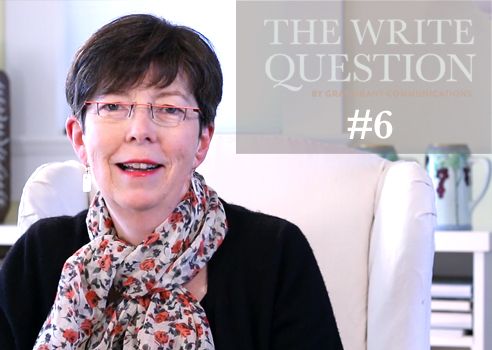Viewing time: 3 minutes 31 seconds
The Write Question is a weekly video podcast about writing that I started in 2017 and that ran, more or less weekly, until April 2022. This is a republication of the issue #6, about how to recognize good writing, which ran on Feb. 24/17.
Transcript:
Welcome to The Write Question, the video-podcast designed to answer your questions about writing. I’m Daphne Gray-Grant.
Today I have a question from Antony Steventon from Shrewsbury, England. His question relates to how to recognize good writing. “I have read a number of experts — including you — who suggest analyzing good writing. This is great advice but how do you recognize the good writing, in the first place? Just because I like reading something doesn’t mean that it’s particularly well written. How will I know?”
That’s a terrific question, Antony. People have a great deal of insecurity about their ability to write. But they have an almost equal insecurity about their ability to identify good writing.
So, let me set your mind at rest, you’re not the only one. But I’m guessing you probably don’t have the same concerns about food — because you know your own taste. Do you question your ability to recognize good chocolate, good cheese, or good beer? You may not know what would win prizes but you know what you like. This is because most of us know our own tastes. We know what’s delicious to us and we’re prepared to seek out even more of that delectable food or drink.
EXACTLY the same thing is true of reading. We all have different tastes and we all appreciate different writing. I favour memoir, books about social science and literary fiction. For example…
Charles Duhigg is a New York Times author who has, what for me, is a captivating style. I like the way he uses stories to explain science in his landmark book The Power of Habit. I also like the way he gives a lot of colourful detail. Still, not everyone appreciates him. I suggested this book to a client. But he’d already tried to read it and hated it. That’s okay. That’s the way taste works.
Joan Didion is another favourite author. Her memoir, Blue Nights is one of my most loved books. I like Didion’s use of language and her imagery. But not everyone agrees. One critic said : “Her prose is detached and styled within an inch of its life, full of a disembodied chill.” Again, that’s the way that taste works.
Am I prepared to say that these two writers are the best in the English language? Hell, no. I’m not even prepared to tell you to read them. I’m just giving you the names of two writers *I* happen to like. Why do I like them? It could be the result of the way I was raised, the schooling I had, my life experiences and my own personality.
We are ALL different! And that’s something to celebrate.
So, identify writers you happen to like and then emulate them. That’s going to be a whole lot easier than trying to emulate writers that OTHER people tell you that you should like.
I think most of us were misinformed in high school or university. We were led to believe was some sort of global arbiter of excellence for writing. But there’s not Even a book that’s a bestseller might not appeal to you —I know there are many that don’t appeal to me.
Finally, let me wrap up with a quote from a writer who is adored by many and abhorred by others, J.K. Rowling. She says: “The most important thing is to read as much as you can. It will give you an understanding of what makes good writing. ~ JK Rowling
Thanks for your question, Antony. Good luck with your reading.
Links:
The Power of Habit by Charles Duhigg.
Blue Nights by Joan Didion.


